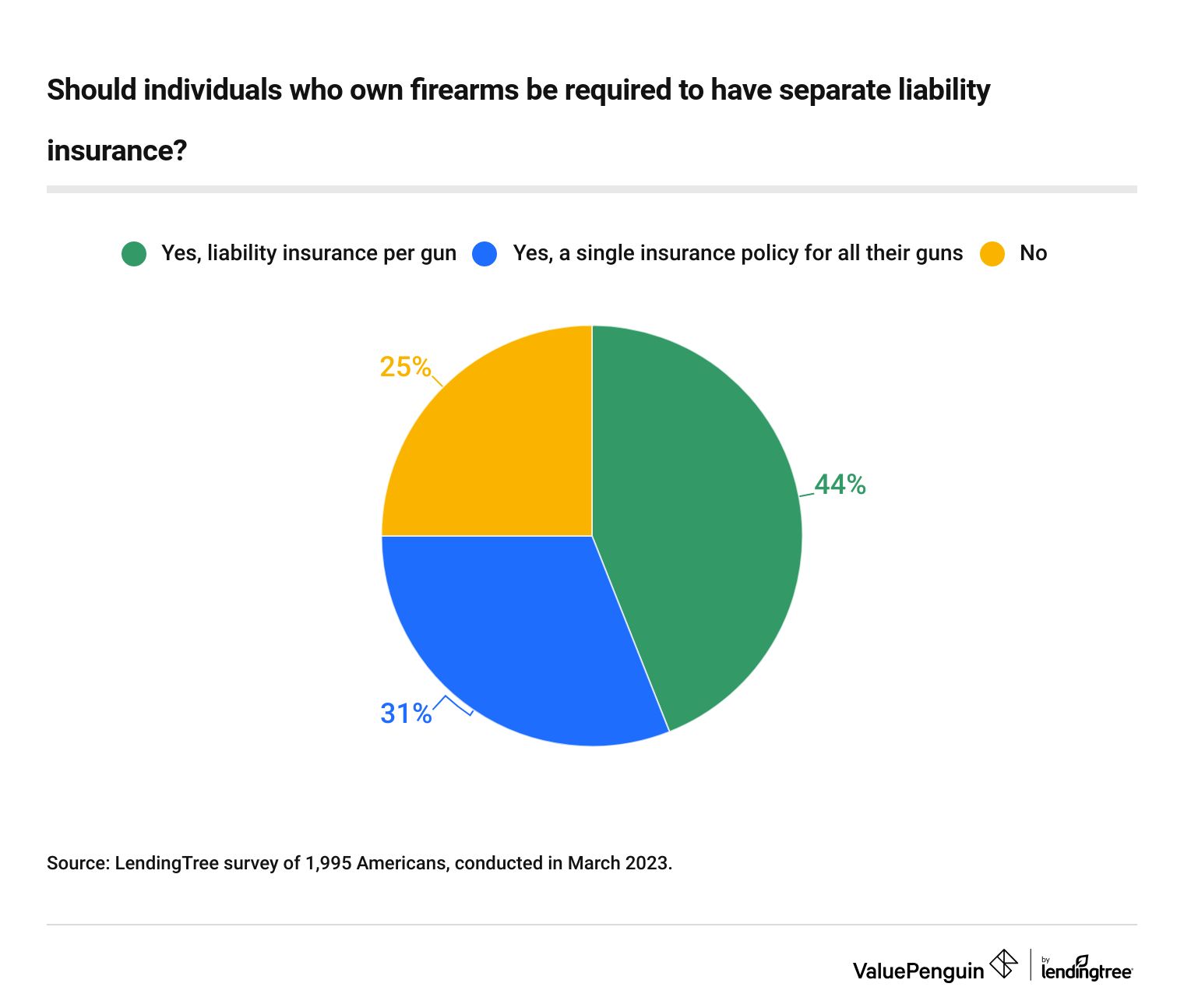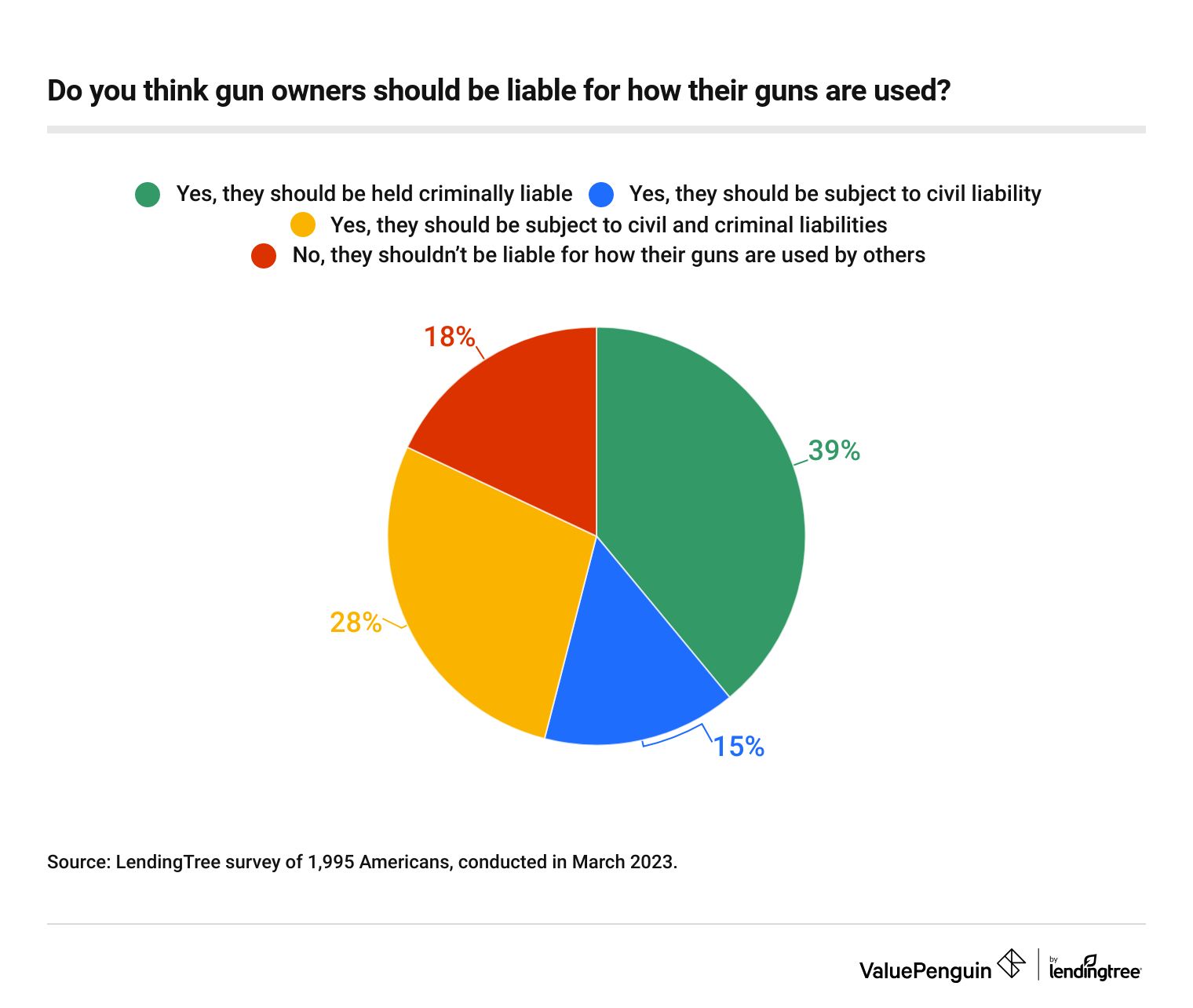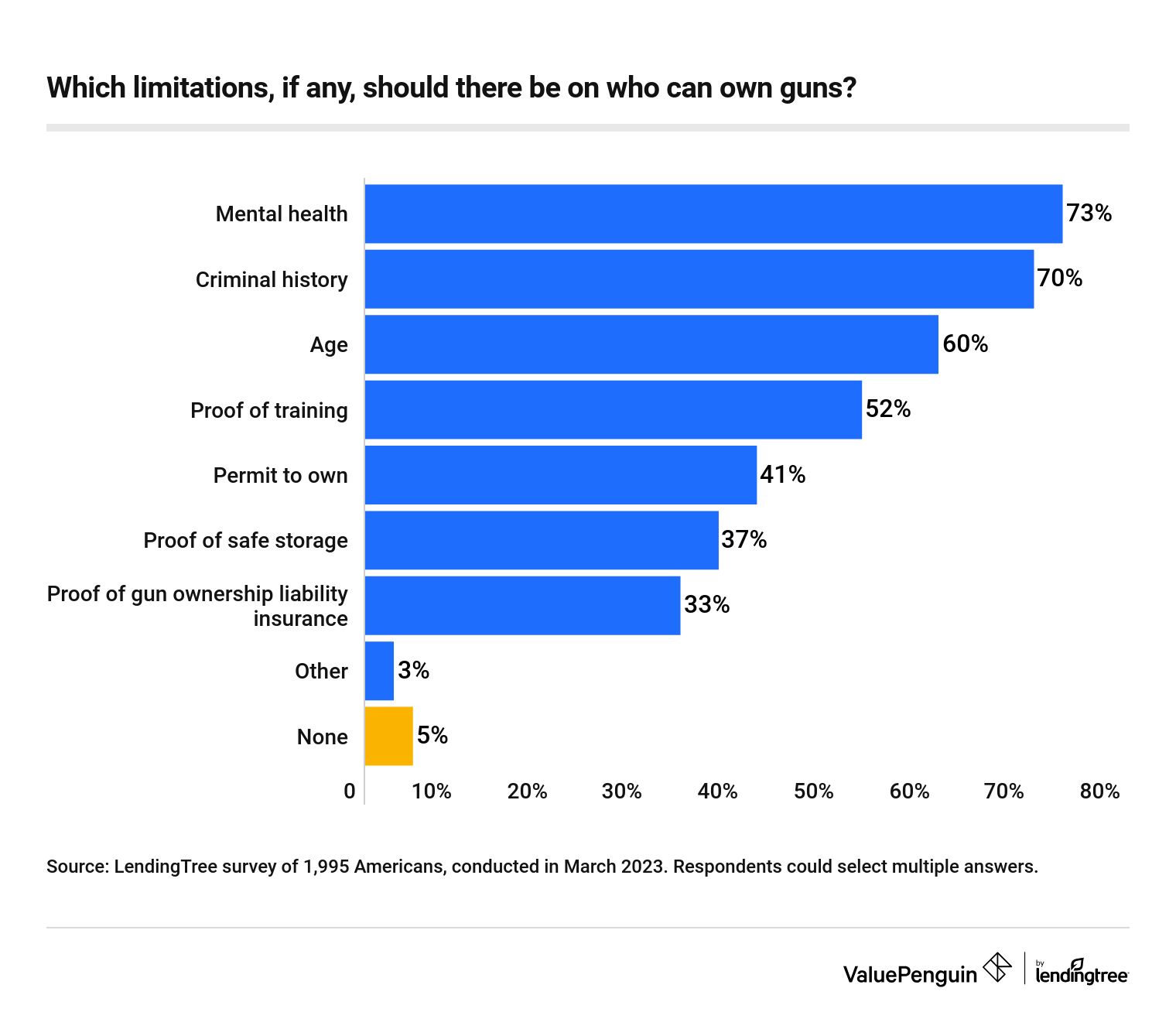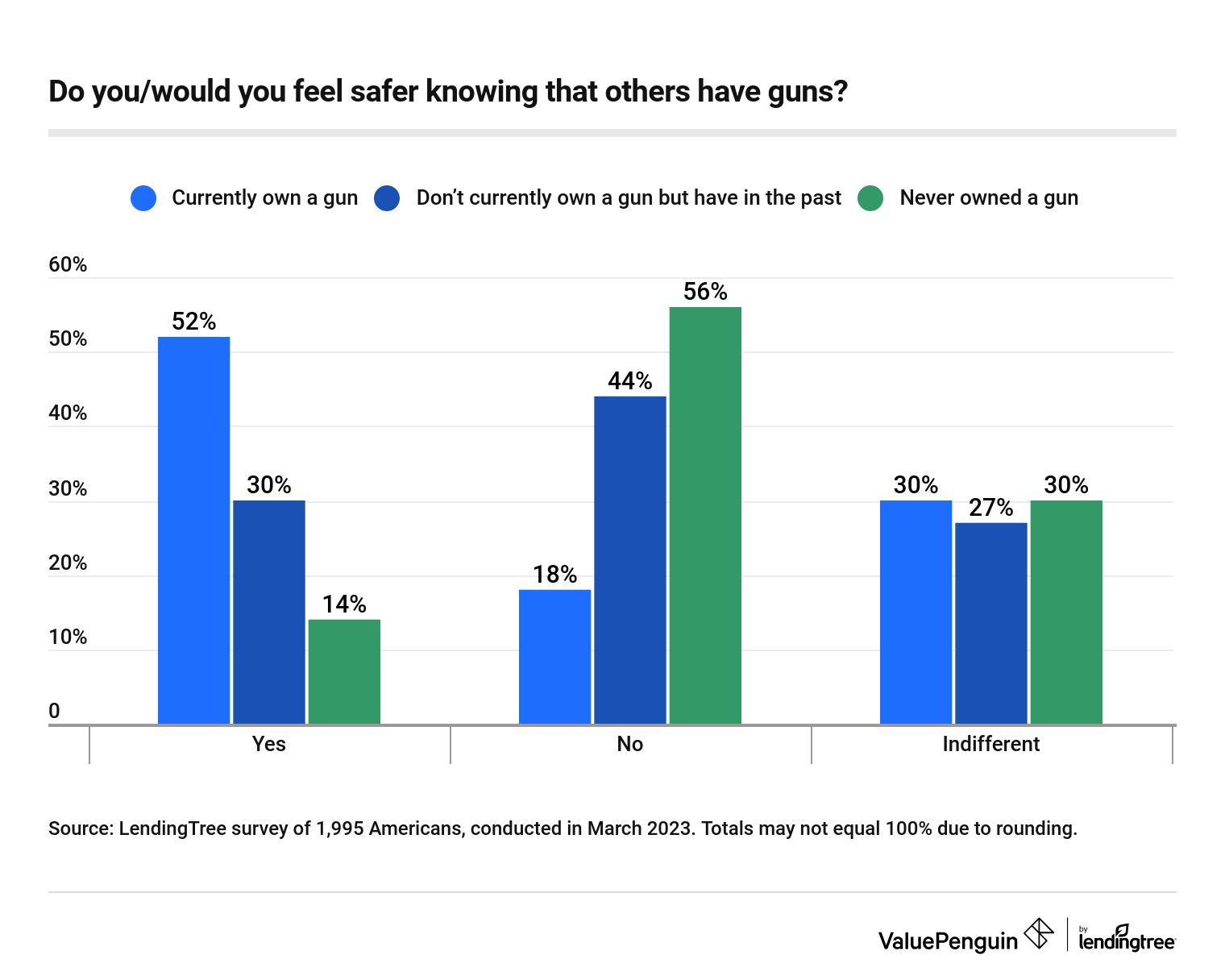Homeowners Insurance
Can Insurers Lead the Way on Gun Control? 75% of Americans Think So — Especially Gen Zers, 6-Figure Earners and Those With Young Kids
Gun violence is a major problem facing the United States, and some people are looking to the insurance sector for help. A new ValuePenguin survey finds 75% of American consumers believe gun owners should be required to have liability insurance on their firearms.
Here’s our breakdown of how the public thinks insurance companies can play a role, as well as tips on insurance and firearms, and how home insurance could help make gun ownership safer.
On this page
Key findings
- Insurance companies could hold a solution to gun control. 75% of Americans believe gun owners should be required to have liability insurance on their firearms. The majority (44%) think firearm owners should be required to have separate insurance policies for each weapon, while 31% say a single policy per owner would be enough. Gen Zers, those earning more than $100,000 and parents with children younger than 18 were especially likely to support insurance requirements.
- Regardless of who pulls the trigger, 82% of Americans say gun owners should be held accountable for how their guns are used. Those with kids 18 or younger are most likely (87%) to hold gun owners responsible for others using their firearms. Among current gun owners, 41% think they should be held criminally liable, 17% think they should be held civilly liable and 22% say both.
- The majority of Americans (95%) support some form of restriction on firearm access. The top firearm regulations Americans support include those centered around mental health (73%), criminal history (70%) and age (60%). However, some views vary based on gun ownership status: Those who’ve never owned a gun are more likely to say firearm permits should be mandatory (47%), compared with those who currently own a gun (31%). They’re also more likely to believe proof of liability insurance and safe storage should be mandatory.
- Carrying a firearm provides a sense of safety for most gun owners (89%), but fewer of them (52%) feel safer knowing others are armed. Among those who’ve never owned a gun, only 14% see gun ownership as making them more secure. Across generations, regardless of firearm ownership, millennials are the most likely to say they feel safer with a gun (57%), and also feeling relatively safer knowing others have guns (31%).
Most Americans want gun owners to have liability insurance
Discussions about gun control don’t often focus on insurance. And yet, most of those surveyed saw insurance policies as a way of addressing gun violence.
As mentioned, 75% of Americans favor requiring liability insurance for gun owners. In fact, support for liability insurance on guns is almost as high as support for liability insurance on homes (72%) or cars (84%).
Gen Zers ages 18 to 26 are most likely to support insurance requirements, with 82% in favor. The idea of insurance requirements also gets strong support among six-figure earners (80%) and parents with kids younger than 18 (78%).

According to ValuePenguin insurance expert Divya Sangameshwar, it’s understandable that Americans favor insurance requirements for gun owners. In fact, she believes insurance may be the smartest way to push for gun control.
What sort of policy do consumers support? The majority (44%) think firearm owners should be required to have a separate insurance policy for each gun, while 31% say a single policy would suffice.
Notably, parents with children younger than 18 are the most likely to support multiple insurance policies. Of this group, 49% say gun owners should have one policy per gun. In comparison, 42% of those with no children and 36% of those with adult children say the same.
Meanwhile, gun owners are slightly less likely to support multiple insurance policies — 40% of gun owners believe that gun owners should be required to have separate liability insurance, versus 48% of those who’ve never been gun owners.
Just how much liability insurance should gun owners get? A 77% majority think gun owners should have between $50,000 and $250,000 in liability coverage for their guns. Meanwhile, just 7% called for $1 million or more in liability insurance for gun owners.
82% want gun owners held accountable for how their gun is used
Insurance is one matter — but when a gun is used, most of those surveyed (82%) say the gun owner should be held responsible for it, regardless of who pulled the trigger.
Once again, Americans with children younger than 18 are most likely (87%) to say they think gun owners should be held responsible for the way their guns are used. Among the generations, millennials ages 27 to 42 are most likely to agree (85%).
In terms of responsibility, 39% of Americans say gun owners should be held criminally liable — a sentiment that’s highest among parents with underage children (45%). Meanwhile, 15% say they should be subject to civil liability and 28% say they should be held liable for both.

Regardless of how blame is assessed, Sangameshwar says gun insurance could encourage responsible behavior.
"Insurers factor in risk when setting premiums, and they will set conditions for coverage," she says. "This means gun owners would be rewarded with more coverage and lower premiums if they have proven to their insurers that they’ve taken all the recommended steps to keep their firearms safe."
"On the flip side, gun owners who fail to adhere to gun safety parameters set by their insurers will face severe financial penalties. This would go a long way in ensuring that gun owners will embrace safety, and vulnerable Americans — like children — will no longer have access to the guns that they can’t otherwise purchase for themselves," Sangameshwar says.
95% support some form of gun restriction
Liabilities and gun ownership status aside, a full 95% majority support some form of restriction on access to firearms. Among restriction types, 73% support regulations regarding mental health — the most common choice. The survey also found broad support for restrictions based on criminal history (70%) and age (60%).

Some respondents also believe gun ownership should require proof of training (52%), a permit to own a gun (41%), proof of safe storage (37%) and proof of gun liability insurance (33%).
While gun owners are equally as likely to support restrictions on mental health, criminal history and age, they’re less likely to support some of the other restrictions. Specifically, they’re 52% less likely to support restrictions than those without guns do — at 31% versus 47% — and are less prone to say proof of liability insurance and safe storage should be mandatory.
Meanwhile, just 5% of Americans think there should be no restrictions on gun ownership at all. Gen Xers ages 43 to 58 (6%) and Americans making less than $35,000 (6%) were the groups most likely to oppose any restrictions on obtaining a gun.
Do firearms make consumers feel safer? It depends
Feeling safe is one of the top priorities for most people, and for some, carrying a firearm is a way to achieve that sense of security.
However, gun owners are less likely to have faith in other gun owners. While 89% of current gun owners say carrying a gun makes them feel safe, just 52% say they feel safer knowing others have guns.
Only 30% of former gun owners say other people’s firearms make them feel more secure, while just 14% of those who’ve never owned a gun agree.

Regardless of gun ownership status, millennials are the most likely generation to say they feel safer with a gun (57%). They also feel the most safe knowing others have guns (31%).
On the other hand, baby boomers are the least likely generation to say they feel safer with a gun (40%) or with others having guns (27%).
Men are also more likely to say a gun gives them a feeling of safety — 57%, compared with just 46% of women. Women are also less confident in other gun owners than men — only 24% of women say they’d feel safe knowing someone else had a gun, compared with 32% of men.
High-income consumers, men most likely to own guns
When it comes to the demographic groups most likely to own guns, look no further than high-income consumers. Americans making $75,000 to $99,999 are the most likely to own guns (39%), followed by those making $100,000 or more (37%).
Men are also more likely to be gun owners than women, by a 36%-to-23% margin. While there are fewer women gun owners, 87% of women said they bought a gun for personal protection — 12 percentage points higher than the 75% of men who say the same. Meanwhile, men are more likely to say they bought a gun for hunting (44%) or sport (23%).
Coincidentally, Americans with children younger than 18 are the most likely to say they own one or more guns at 37%. They were also the group who say they felt safer owning a gun (58%), despite the documented risks of keeping firearms in the home with young, often curious children.
Expert tips on insuring firearms
When it comes to gun ownership and insurance, many homeowners may not know they already have some form of coverage.
The majority (56%) of Americans wrongly believe that their homeowners insurance does not cover their guns, while just 24% do know that their homeowners insurance does cover their guns.
Meanwhile, 20% believe they need to get additional coverage for their guns — and Sangameshwar says they’re right, too.
"Responsible gun ownership won’t raise your homeowners insurance premiums, but most standard policies will only cover you for theft or a firearms-related accident and up to your personal property coverage and liability coverage limits," she says. "You can opt to get more personal property coverage or liability coverage for peace of mind, but your homeowners insurance won’t cover you if you are charged with using the gun to commit a crime."
Sangameshwar says that as a first-time gun owner, you should look at your standard homeowners or renters insurance policy to determine what your coverage limits are and increase your personal property coverage limits or add an umbrella insurance policy for extra liability coverage.
Methodology
ValuePenguin commissioned Qualtrics to conduct an online survey of 1,995 U.S. consumers ages 18 to 77 from March 17 to 21, 2023. The survey was administered using a non-probability-based sample, and quotas were used to ensure the sample base represented the overall population. Researchers reviewed all responses for quality control.
We defined generations as the following ages in 2023:
- Generation Z: 18 to 26
- Millennial: 27 to 42
- Generation X: 43 to 58
- Baby boomer: 59 to 77
